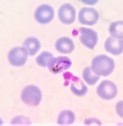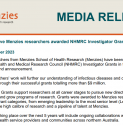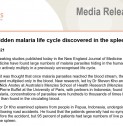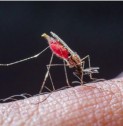Dr Steven Kho
Senior Research Fellow
Qualifications:
PhD, Charles Darwin University, 2019; Bachelor of Science (Honours in Biochemistry), University of Western Australia, 2010; Bachelor of Science (Molecular Biology & Biotechnology), University of Western Australia, 2009;
Research Topic:
The hidden splenic Plasmodium reservoir as a target to reduce global malaria burden
Location:
Darwin - Royal Darwin Hospital campus
Biography:
Steven grew up in Indonesia and came to Australia in 2007 to complete his undergraduate degree at the University of Western Australia in Perth.
In 2012, Steven relocated to Darwin and joined Menzies as a research assistant in the Global and Tropical Health team, focusing on malaria research.
In 2019, Steven graduated with a PhD from Charles Darwin University and Menzies. His current research focuses on understanding the pathophysiological role of the spleen and innate host components such as platelets and neutrophils in human malaria. His field studies in Papua have found that platelets directly attack and kill parasites in the blood of malaria patients, which may lead to the identification of novel therapeutic targets to treat malaria or alleviate disease severity. Steven’s research has informed treatment policy for splenectomised patients living in endemic areas of Indonesia who are at higher risk of vivax and falciparum malaria. He recently discovered that the human spleen is the major reservoir for P. falciparum and P. vivax parasites in chronic malaria and received the prestigious Am. Soc. Trop. Med. Hyg. Young Investigator award for his achievements. Steven is currently working to dissect the splenic reservoir’s fundamental biology to inform the development of new and improved malaria control strategies.
Research Themes
- The human spleen as a reservoir for Plasmodium species: discovery of the cryptic endosplenic lifecycle
- Mechanisms underlying splenic accumulation of malaria parasites and its endosplenic lifecycle
- Splenic Plasmodium dormancy and reduced drug susceptibility: implications in malaria elimination
- Evaluation of peripheral markers to estimate the hidden splenic reservoir in human malaria
- Mechanisms of splenomegaly, splenic red cell congestion and its contribution to malarial anemia
- Splenic mechanisms driving and/or maintaining malaria tolerance of innate cells
- The hidden splenic Plasmodium falciparum and P. vivax reservoir in Africa: prevalence, magnitude and seasonal variations
- Role of the human spleen in erythropoiesis and reticulocyte biology
- Risks of malaria and other clinical outcomes after splenectomy in malaria endemic areas: Informing policy for management of splenectomised patients
- The roles of platelets, red cell interactions, extracellular traps and host immune cells in human malaria
- Extracellular traps in children with non-cystic fibrosis bronchiectasis
- Leonardo L., Kenangalem E., Poespoprodjo J.R., Noviyanti R., Price R.N., Anstey N.M., Minigo G., Kho S. Increased circulating myeloid-derived suppressor cells in vivax malaria and severe falciparum malaria. Malar J, 2022 Sep 8;21(1):255
- Kho S., Anstey N.M., Barber B.E., Piera K.A., William T., Kenangalem E., McCarthy J.S., Jang I.K., Domingo G.J., Britton S., Grigg M.J. Diagnostic performance of a 5-plex malaria immunoassay in regions co-endemic for Plasmodium falciparum, P. vivax, P. knowlesi, P. malariae and P. ovale. Sci Rep, 2022 May 4;12(1):7286.
- Kho S., Qotrunnada L., Leonardo L., Andries B., Wardani P.A.I., Fricot A., Henry B., Hardy D., Margyaningsih N.I., Apriyanti D., Puspitasari A.M., Prayoga P., Trianty L., Kenangalem E., Chretien F., Safeukui I., Del Portillo H.A., Fernandez-Becerra C., Meibalan E., Marti M., Price R.N., Woodberry T., Ndour P.A., Russell B.M., Yeo T.W., Minigo G., Noviyanti R., Poespoprodjo J.R., Siregar N.C., *Buffet P.A., *Anstey N.M. Hidden biomass of intact malaria parasites in the human spleen. New Engl J Med, 2021 May; 384(21):2067-2069.
- Kho S., Qotrunnada L., Leonardo L., Andries B., Wardani P.A.I., Fricot A., Henry B., Hardy D., Margyaningsih N.I., Apriyanti D., Puspitasari A.M., Prayoga P., Trianty L., Kenangalem E., Chretien F., Brousse V., Safeukui I., Del Portillo H.A., Fernandez-Becerra C., Meibalan E., Marti M., Price R.N., Woodberry T., Ndour P.A., Russell B.M., Yeo T.W., Minigo G., Noviyanti R., Poespoprodjo J.R., Siregar N.C., *Buffet P.A., *Anstey N.M. Evaluation of splenic accumulation and colocalization of immature reticulocytes and Plasmodium vivax in asymptomatic malaria: a prospective human splenectomy study. PLOS Med, 2021 May; 18(5):e1003632.
- Kho S., Minigo G., Andries B., Leonardo L., Prayoga P., Poespoprodjo J.R., Kenangalem E., Price R.N., Woodberry T., Anstey N.M., Yeo W.Y. Circulating neutrophil extracellular traps and neutrophil activation are increased in proportion to disease severity in human malaria. The Journal of Infectious Diseases, June 2019, 219(12):1994-2004.
- Kho S., Andries B., Poespoprodjo J.R., Commons R.J., Shanti P.A.I., Kenangalem E., Douglas N.M., Simpson J.A., Sugiarto P., Anstey N.M., Price R.N. High risk of Plasmodium vivax malaria following splenectomy in Papua, Indonesia. Clinical Infectious Diseases, January 2019, 68(1):51-60.
- Kho S., Barber B.E., Johar E., Andries B., Poespoprodjo J.R., Kenangalem E., Piera K.A., Ehmann A., Price R.N., William T., Woodberry T., Foote S., Minigo G., Yeo T.W., Grigg M.J., Anstey N.M.*, McMorran B.J.* [*equal last]. Platelets kill circulating parasites of all major Plasmodium species in human malaria. Blood, September 2018, 132:1332-1344
- Kho, S., Marfurt, J., Handayuni, I., Pava, Z., Noviyanti, R., Kusuma, A., et al. (2016). Characterization of blood dendritic and regulatory T cells in asymptomatic adults with sub-microscopic Plasmodium falciparum or plasmodium vivax infection. Malaria Journal, 15, 328.
- Wirjanata, G., Handayuni, I., Prayoga, P., Apriyanti, D., Chalfein, F., Sebayang, B.F., et al. (2015). Quantification of Plasmodium ex vivo drug susceptibility by flow cytometry. Malaria Journal ,14(1), 417.
- Kho, S., Marfurt, J., Noviyanti, R., Kusuma, A., Piera, K., Burdam, F.H., et al. (2015). Preserved dendritic cell HLA-DR expression and reduced regulatory T cell activation in asymptomatic plasmodium falciparum and P. vivax infection. Infection and Immunity, 83(8), 3224.
-
MEDIA RELEASE | Five Menzies researchers awarded NHMRC Investigator Grants
Five researchers from Menzies have been awarded NHMRC Investigator Grants in today’s funding round announcement, totaling more than $9 million.
-
.jpg&w=123&h=126)
Parasit malaria bersembunyi di organ limpa
-

Parasit Malaria Bisa Bersembunyi di Limpa Manusia
Studi terbaru mengungkapkan, parasit malaria terbukti lebih banyak yang bersembunyi dan berkembang biak di dalam limpa manusia. Temuan tersebut mendefinisikan ulang siklus hidup malaria.
-

Penelitian Berhasil Ungkap Parasit Malaria Bersembunyi di Limpa Sumber: https://mediaindonesia.com/humaniora/408850/penelitian-berhasil-ungkap-parasit-malaria-bersembunyi-di-limpa
LEMBAGA Biologi Molekuler Eijkman mengatakan hasil penelitian yang dilakukan Eijkman dan rekannya menunjukkan sejumlah besar parasit malaria ternyata bersembunyi di organ limpa.
-
.jpg&w=123&h=126)
Parasites may accumulate in spleens of asymptomatic individuals infected with malaria
Study suggests immature red blood cells in spleen are targeted for invasion by P. vivax.
-

Malaria is not only a blood disease, it also hides in the spleen, scientists have discovered
Groundbreaking new research has found large numbers of malaria parasites hiding in the spleen. Until now, it was thought that once malaria parasites reached the bloodstream, they circulated and multiplied only in the blood.
-
Hidden malaria life cycle discovered in the spleen
Ground-breaking studies published today in the New England Journal of Medicine and PLOS Medicine have found large numbers of malaria parasites hiding in the human spleen where they actively multiply in a previously unrecognised life cycle.
-
CDU, Menzies researcher leads battle against malaria
National Tribune Online news | Graduating this week with a PhD, rising star malaria researcher Dr Steven Kho.
-
MediaNewsroomCDU, Menzies researcher leads battle against malaria CDU, Menzies researcher leads battle against malaria
Blood platelets, neutrophils and the spleen have novel roles in people with malaria, according to new research from Charles Darwin University (CDU) and Menzies School of Health Research.
-
Health Issues India | Could a malaria treatment be found in human blood?
Could a new defence against malaria be found in human blood? Research suggests that human platelets — a component of the blood — form a first-line defence against the malaria parasite.
-

Research reveals defence against malaria parasites
The study, which has just been published in the prestigious journal Blood, was led by Associate Professor Brendan McMorran at ANU and Professor Nick Anstey at Darwin's Menzies School of Health Research
-
Xinhuanet.com|Platelets kill up to 60 pct of malaria parasites: Australian study
The study, published by the Menzies School of Health Research (MSHR) in Australia's Northern Territory (NT), revealed that platelets attack and kill malaria parasites in the bloodstream.
-

Platelets the first line of defence in malaria patients
The humble platelet is usually regarded as just a tiny cell that helps the blood clot. A study just published in the prestigious journal Blood has found that platelets attack and kill malaria parasites in infected humans to reduce the number of parasites circulating in their blood.







